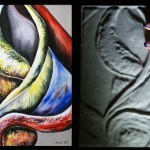Manufacturing, tech, ag, arts at center of economic vision for WV
Op-ed in the Charleston Gazette-Mail, Sunday, March 13, 2016

Dr. Stephanie Skolik, a Huntington ophthalmologist and artist, turned to the Robert C. Byrd Institute for Advanced Flexible Manufacturing to help make her artwork more accessible to the visually impaired. RCBI engineers recreated her painting (at left) in relief using 3D-printing technology. The 3D-printed relief accompanied Skolik’s painting during her exhibit at the Huntington Museum of Art titled “Inner and Outer Vision: The Paintings of Stephanie A. Skolik, M.D.”
As West Virginia continues to transition its economy, entities across the state are working to build capacity from within our borders, particularly in those sectors focused on innovation.
While many people think of the creative economy as only artist-specific, the sector has evolved nationally to include any economic endeavor that requires creative processes to sustain or expand operations. As we invest in efforts to build a prosperous Mountain State, it is vital that support for entrepreneurship remains a priority in this time of economic transition.
Fortunately, the West Virginia innovation economy is made up of established statewide players that include the Tamarack Foundation for the Arts, TechConnect West Virginia, the West Virginia Food & Farm Coalition and the Robert C. Byrd Institute for Advanced Flexible Manufacturing (RCBI).
These organizations are diverse in their individual missions and far-reaching in their own right. Together, they have the great potential to have a substantial impact on our communities, many of which are in desperate need of economic revitalization.
The Tamarack Foundation for the Arts has worked to build the creative economy through artist entrepreneurship since 2003. The work of the foundation — a separate statewide organization from the retail facility — has helped creative businesses, whether juried into Tamarack or not, access new markets outside the state and with small-business development resources. The foundation’s efforts have led to substantial returns for creative enterprises in media such as textiles, wood, glass and fine art. Importantly, the foundation also works to help retain artists in the state and build culturally rich communities.
TechConnect WV has seen equal success in the emergence of new technology-based businesses since its inception in 2006. TechConnect WV seeks to diversify the state’s economy through innovation-based economic development, primarily in the areas of advanced energy, chemicals and advanced materials, biometrics and biotechnology. The organization works to build research and development and commercialization capacity, with incentives for innovation-based start-ups.
The WV Food & Farm Coalition, established in 2010, works to improve the viability of the local food sector by building and supporting a network of those involved in West Virginia’s local food economy. The coalition encourages engagement in new economic opportunities by taking advantage of new distribution models, promoting new and young farm operations, and advocating for needed state food policy changes — all tactics to make the food economy thrive in our state. Many of the “new” models the coalition’s network promotes are old models but with a focus on local ownership, such as producer cooperatives that sell diverse products to urban areas in the state. The Monroe Farm Market in southeastern West Virginia is one shining example.
Importantly, the Robert C. Byrd Institute for Advanced Flexible Manufacturing builds on the work of these organizations — collaboratively supporting arts, technology and agricultural businesses in new and innovative ways. Established in 1990, RCBI has long been known for its work supporting small and mid-sized manufacturers.
RCBI’s Agricultural Innovations initiative — just two years old — has helped small farms increase their profitability and sustainability. Its work in this short time has included introducing Lean Agriculture to farmers and food aggregators in order to make their work more efficient, researching manufacturing-style value chain trucking routes that could connect disparate farm operations to help them share resources and working with entrepreneurs to bring new farm tools and technology to market.
RCBI also supports artists with advanced manufacturing technology. In early 2015, RCBI helped Dr. Stephanie Skolik, a Huntington artist, bring technology to her exhibit “Inner and Outer Vision: The Paintings of Stephanie A. Skolik, M.D.” by transforming one of her paintings into a tactile experience using 3D printing technology, introducing a new medium and new audience to her art. Additionally, for the past two years, RCBI has showcased some of West Virginia’s finest artists and entrepreneurs with the West Virginia Makes Festival, an annual event celebrating Mountain State creativity in all forms.
Economic development for the future of West Virginia will not look like our past endeavors. Organizations that can adapt to the evolving economy and support expanded entrepreneurial efforts will be vital to our success. Each of these sectors and their collaborative impact must be part of our state’s focus. When we prioritize the minds and abilities within our own borders to build businesses and create opportunities, we create new pathways to local prosperity. Simply put, we cannot rely on our past to create our future. We must leverage our strengths in new and innovative ways.
